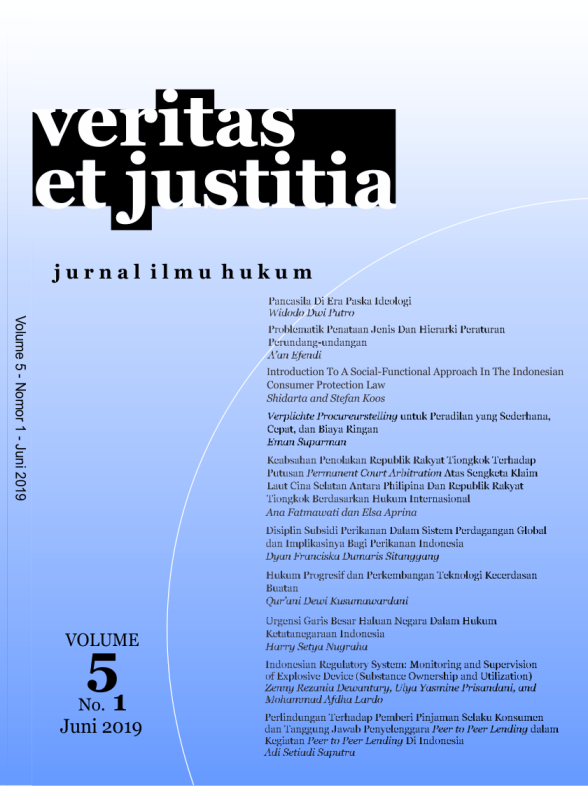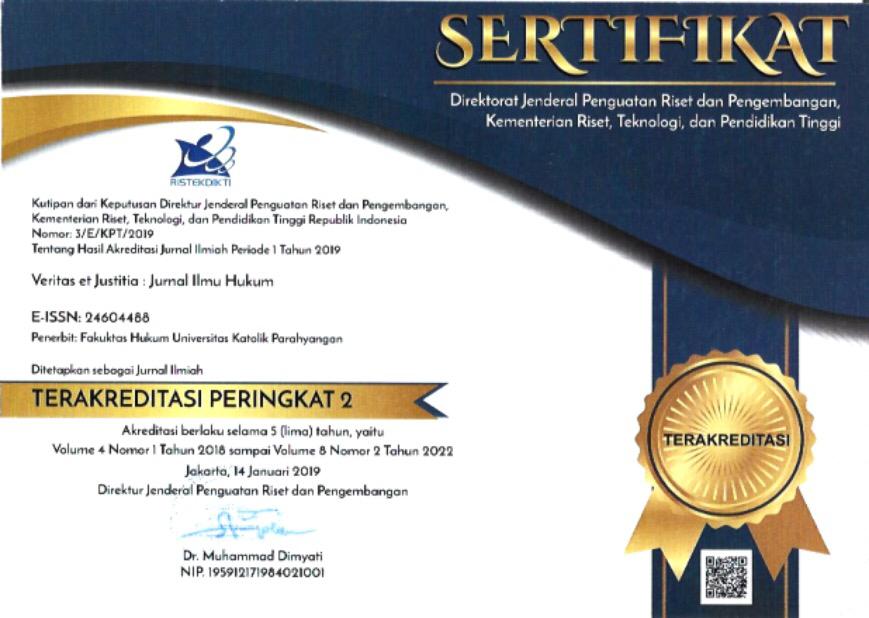PANCASILA DI ERA PASKA IDEOLOGI
DOI:
https://doi.org/10.25123/vej.v5i1.3233Abstrak
It is considered axiomatic that Pancasila has been accepted as State ideology (formally and final) and in addition been perceived as the ultimate source of all legal sources. But this acceptance as axiom leads to the fact that Pancasila has almost never been reflected upon. This said in consideration that the basis for this ideology, the contemporary society tends to be suspicious of ideology or grand narratives. This article, as a reflective-critical analysis, shall discuss how Pancasila is understood by the Indonesian post ideological society. The critiques put forward is meant to offer an alternative value transformation for a society disillusioned by grand narratives.
Referensi
Buku:
Auguste Comte, A General View of Positivism (1865), trans. H.J. Bridges, Cambridge University Press, Cambridge, 2009.
Daniel Bell, The End of Ideology, The Free Press, New York, 1960.
Daniel Bell, The End of Ideology: On the Exhaustion of Political Ideas in Fifties, The Free Press, New York, 1960.
Eliane Glaser, Anti-Politics: On the Demonization of Ideology, Authority and the State, Repeater, Books, London, 2018.
F. A. Hayek, The Fatal Conceit: The Errors of Socialism, Vol. 1 of The Collected Works of F. A. Hayek, ed. W. W. Bartley III, University of Chicago Press, Chicago, 1989.
Ferry Hidayat, Pancasila: Perspektif Pendiri RI dan Problematikanya, STIBA Pertiwi, Bekasi, tanpa tahun.
Francis Fukuyama, The End of History and the Last Man, The Free Press, New York, 1992.
G.W.F. Hegel, The Phenomenology of Mind, trans. B.J. Baillie, Blackmask Online, 2001.
Hanna Samir Kassab, The Power of Emotion in Politics, Philosophy, and Ideology, Palgrave Macmillan, New York, Basingstoke, 2016.
Humberto R. Maturana dan Francisco J. Varela, Autopoiesis and Cognition, Dordrecht: D. Reidel Publishing Company, 1980.
Ibn Warraq, The Islam in Islamic Terrorism: The Importance of Beliefs, Ideas, and Ideology, New English Preview Press, Nashville, 2017.
Jonathan Wolff, Why Read Marx Today, Oxford University Press, Oxford, 2002.
Jürgen Habermas, Communication and The Evolution of Society, Heinemann, London, 1979.
Milton Friedman, Capitalism and Freedom, University of Chicago Press, Chicago, 1962.
Muhammad Hatta dan Zainul Yasni, Bung Hatta Menjawab: Wawancara Dr. Mohammad Hatta dengan Dr. Z. Yasni, Gunung Agung, Jakarta, 1980.
Rachel S. Turner, Neo-Liberal Ideology, History, Concepts and Policies, Edinburgh University Press, Edinburgh, 2008.
Raymond Aron, The Opium of the Intellectuals, Norton, New York, 1962.
Reo M. Cristenson (et.al), Ideologies and Modern Politics, Dodd, Mead & Company, New York, 1975.
Rian Adhivira Prabowo, Homo Sacer 1965: Perampasan Hak Dan Pelampauan Atasnya, Tesis Fakultas Hukum, Universitas Diponegoro, 2015.
Risalah Sidang Badan Penyelidik Usaha-Usaha Persiapan Kemerdekaan Indonesia, Edisi ke IV, Sekretariat Negara Republik Indonesia, Jakarta, 1998.
Robertus Robet, Manusia Politik: Subyek Radikal dan Politik Emansipatoris di Era Kapitalisme Global menurut Slavoj Zizek, PT. Wahana Aksi Kritika, Tangerang, 2010.
Rolf Petri, A Short History Western Ideology. A Critical Account, Bloomsbury Publishing, London, 2018.
Seymour Martin Lipset, Political Man, Heinemann, London, 1960.
Wawan Tunggul Alam (ed.), Bung Karno Menggali Pancasila, Gramedia, Jakarta, 2000.
Wawan Tunggul Alam, Demi Bangsaku Pertentangan Bung Karno vs. Bung Hatta, Gramedia, Jakarta, 2003.
Zygmunt Bauman, Liquid Modernity, Polity Press, Cambridge, 2000.
Artikel:
As’ad Said Ali, Pertarungan Ideologi: Indonesia Kini, 5 Jurnal Intelijen & Kontra Intelijen Maret – April 2009.
John Schwarzmantel, Hegemony and Contestation in Post-Ideological Society, Paper to be presented at the ECPR Joint Sessions of Workshops, Uppsala, 13-17 April 2004.
Khalid Azees & Alejandra Gaitan-Barrera, Power, Ideology, Politics and the Revolutionary Subject, 45 Critique Journal of Socialist Theory 2017.
Michael Freeden, Confronting The Chimera of A ‘post-ideological’’ Age, Paper to be presented at the ECPR Joint Sessions of Workshops, Uppsala, 13-17 April 2004.
Widodo Dwi Putro, Pertikaian Ideologi: Dari “Hubungan Produksi” sampai “Kesadaran” , Kompas, 23 September 2002.
Internet:
https://en.oxforddictionaries.com/definition/post-ideological.
http://bangka.tribunnews.com/2016/04/10/zaskia-gotik-sila-bebek-nungging-hingga-jadi-duta-pancasila.
Douglas Kellner, “Ernst Bloch, Utopia and Ideology Critique Douglas Kellner” dalam artikel lepasnya “Ernst Bloch, Utopia and Ideology Critique”, diakses pada tanggal 28 November 2008 dalam http://www.uta.edu/huma/illuminations/kell1.htm
Robert A. Weinberg, “How Cancer Arises,” diakses pada tanggal 22 April 2019
dalam https://courses.washington.edu/gs466/readings/Weinberg.pdf
Peraturan:
TAP MPRS XXV/MPRS/1966 tentang Pembubaran Partai Komunis Indonesia.
##submission.downloads##
Diterbitkan
Terbitan
Bagian
Lisensi
Authors who publish with this journal agree to the following terms:
Authors retain copyright and grant the journal right of first publication with the work simultaneously licensed under a Creative Commons Attribution License that allows others to share the work with an acknowledgement of the work's authorship and initial publication in this journal.
Authors are able to enter into separate, additional contractual arrangements for the non-exclusive distribution of the journal's published version of the work (e.g., post it to an institutional repository or publish it in a book), with an acknowledgement of its initial publication in this journal.
Authors are permitted and encouraged to post their work online (e.g., in institutional repositories or on their website) prior to and during the submission process, as it can lead to productive exchanges, as well as earlier and greater citation of published work.
The Journal allow the author(s) to hold the copyright and to retian publishing rights without restrictions.










